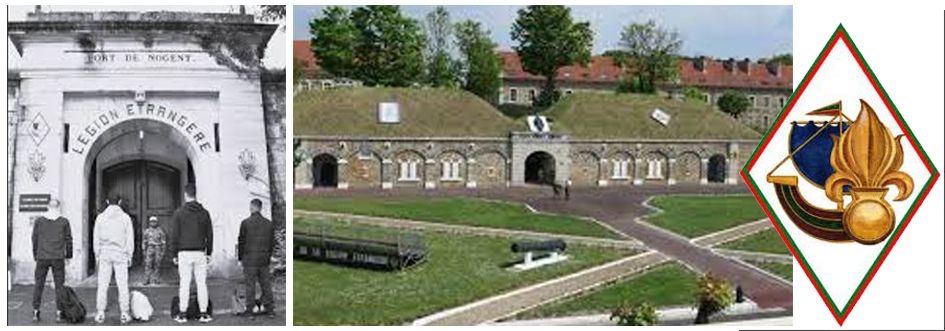On the Merits of Veterans' Associations
and the Intolerance of Some
By Antoine Marquet
I just read on Facebook the dismay of a former platoon leader who "dared"—poor fellow!—to politely offer his opinion on another veteran's page about a general highly regarded by that veteran. He was immediately insulted, harassed, and then blocked, without even being given the right to reply. A fine display of open-mindedness toward a fellow legionnaire who served under the general in question, while the one who was crying out like a startled virgin was already retired… and undoubtedly less entitled to give his opinion. The triennial congress of the FSALE and its affiliated associations was held this summer at the 4th Foreign Regiment, the Legion's philosophical crucible, where the common herd who had the courage to "walk through the door" is transformed into a legionnaire. Then, within his future regiment, he becomes a seasoned soldier, hardened daily by demanding training that prepares him for the toughest battles.
Then comes the return to civilian life. A new world opens up to him, and he can, if he wishes, join an association of former legionnaires.
I just read on Facebook the dismay of a former platoon leader who "dared"—poor fellow!—to politely offer his opinion on another veteran's page about a general highly regarded by that veteran. He was immediately insulted, harassed, and then blocked, without even being given the right to reply. A fine display of open-mindedness toward a fellow legionnaire who served under the general in question, while the one who was crying out like a startled virgin was already retired… and undoubtedly less entitled to give his opinion. The triennial congress of the FSALE and its affiliated associations was held this summer at the 4th Foreign Regiment, the Legion's philosophical crucible, where the common herd who had the courage to "walk through the door" is transformed into a legionnaire. Then, within his future regiment, he becomes a seasoned soldier, hardened daily by demanding training that prepares him for the toughest battles.
Then comes the return to civilian life. A new world opens up to him, and he can, if he wishes, join an association of former legionnaires.
.jpg?t=17dd34a1_7cef_4edb_a5bf_05202457291f)
Established by our esteemed predecessors at the beginning of the last century, these associations played a vital role. For decades, legionnaires returning to civilian life experienced great difficulty integrating into society. All had served France far from mainland France—with the exception of veterans of the two World Wars—and had to adapt to an often hostile environment. Finding work, housing, healthcare, survival: nothing was easy. The veterans' associations, as well as the creation of the Maison d’Auriol in the 1930s, and then the Maison de Puyloubier in the 1950s, were a major boon to the Legion community. All these veterans shared not only the status of Legionnaire, but also the experience of war—at a time when the world still moved at a more human pace.

The relocation of regiments to mainland France changed everything. There were those who had “served in Algeria,” some of whom had only completed basic training or earned their paratrooper wings there, and then the others—those from Corsica, and later from Castelnaudary. Seven years after the Algerian War, the Legion was not again engaged in combat, in Chad.
During this period, short in historical terms but long in a man's life, young veterans were sometimes given a cold reception in veterans' associations: they were considered "without campaigns," therefore worthless. A kind of second-rate legionnaires!
During this period, short in historical terms but long in a man's life, young veterans were sometimes given a cold reception in veterans' associations: they were considered "without campaigns," therefore worthless. A kind of second-rate legionnaires!


Modern conflicts then offered new generations the opportunity to distinguish themselves in turn. The Gulf War, which saw the reinstatement of the Croix de Guerre—which had disappeared since the Indochina War—undoubtedly ruffled a few feathers:
"Ah, but that Croix de Guerre, it's not the same..." As if the lethal bullet had a label: Made in Indochina, Made in Iraq, or later, Made in Afghanistan!
The gap between veterans and younger generations remained, if not widened.
"Ah, but that Croix de Guerre, it's not the same..." As if the lethal bullet had a label: Made in Indochina, Made in Iraq, or later, Made in Afghanistan!
The gap between veterans and younger generations remained, if not widened.

To this have been added particularities that I consider—from my own perspective—superfluous: associations for former paratroopers, members of the 2nd Foreign Infantry Regiment, Chinese veterans, Korean veterans, motorcyclists… why not one for former gas company personnel tomorrow?
Even today, the existence of an association for the corporals of a foreign engineering regiment raises questions: what are its objectives? Is simply being a former legionnaire no longer enough?
From the slowness of a man walking, we have moved to the speed of a galloping horse, bit in mouth. Legionnaires are now de facto integrated into the national fabric; their origins have broadened considerably; they travel, disperse, and feel less of a need to regroup. The veterans' associations meet two or three times a year, or, in larger cities, every week, to play cards, sing, listen to a lecture, or discuss the latest military parade—in this Legion "that isn't what it used to be... like the one in my day!" All of this, in my eyes, is nonsense and pointless clan warfare.
What if the older members stopped treating the younger ones like good-for-nothings, and the younger ones stopped seeing their elders as "old, even very old, fools"? Everyone would benefit, because there is strength in unity. And this strength, that of veterans united despite their differences, could help maintain the lasting image the world has of our institution—and support it on issues that active members cannot address. To be convinced of this, one only needs to mention the symbol of the law "French by blood shed." I'm willing to believe that recruitment is going well. Never before has the Legion been so talked about. The Recruitment Office has even been transformed into a quasi-troop unit!
Even today, the existence of an association for the corporals of a foreign engineering regiment raises questions: what are its objectives? Is simply being a former legionnaire no longer enough?
From the slowness of a man walking, we have moved to the speed of a galloping horse, bit in mouth. Legionnaires are now de facto integrated into the national fabric; their origins have broadened considerably; they travel, disperse, and feel less of a need to regroup. The veterans' associations meet two or three times a year, or, in larger cities, every week, to play cards, sing, listen to a lecture, or discuss the latest military parade—in this Legion "that isn't what it used to be... like the one in my day!" All of this, in my eyes, is nonsense and pointless clan warfare.
What if the older members stopped treating the younger ones like good-for-nothings, and the younger ones stopped seeing their elders as "old, even very old, fools"? Everyone would benefit, because there is strength in unity. And this strength, that of veterans united despite their differences, could help maintain the lasting image the world has of our institution—and support it on issues that active members cannot address. To be convinced of this, one only needs to mention the symbol of the law "French by blood shed." I'm willing to believe that recruitment is going well. Never before has the Legion been so talked about. The Recruitment Office has even been transformed into a quasi-troop unit!

The hype surrounding our beloved Legion has given way to a sometimes indecent display. A corporal, index finger raised like Uncle Sam, explains to anyone who will listen what the Legion is, the role of its officers… Groups form to sing the praises of this or that individual, whose careers have sometimes unfolded between offices, Kronenbourg nights, and cross-country tracks. All of this is undoubtedly necessary, but current recruitment often seems motivated by petty interests: administrative regularization, access to citizenship, family stability.
These legionnaires, though ready to offer their lives to France, live in a world very different from the one where veterans' associations played a vital role. The desire to enlist remains the same, but what sense of wonder can the Legion still offer? Africa has closed itself off, sometimes brutally; two basic units remain overseas, reinforced by personnel from all branches of the armed forces—not exclusively legionnaires. The legionnaire isn't one for barracks life: he needs sunshine and space to recover his strength.
In a different color scheme, he reminds me of those French regiments from the Warsaw Pact era, facing east, like Lieutenant Drogo watching the north, waiting for an enemy that never came…
These legionnaires, though ready to offer their lives to France, live in a world very different from the one where veterans' associations played a vital role. The desire to enlist remains the same, but what sense of wonder can the Legion still offer? Africa has closed itself off, sometimes brutally; two basic units remain overseas, reinforced by personnel from all branches of the armed forces—not exclusively legionnaires. The legionnaire isn't one for barracks life: he needs sunshine and space to recover his strength.
In a different color scheme, he reminds me of those French regiments from the Warsaw Pact era, facing east, like Lieutenant Drogo watching the north, waiting for an enemy that never came…

Thanks to Major (ret.) Pierre Jorand, an information session is held every week, free of charge, for those leaving the service—end of contract or retirement—to encourage them to join the veterans' association closest to their future home. His dedication is admirable… but already, the cost of his travel is being discussed!
For the greater good, despite the obstacles that will arise in the path of every former legionnaire, let us remain united despite our differences in careers, ranks, seniority, battles, or fates, and let us strive to keep our veterans' associations alive and increase their membership, where sometimes supporters outnumber the actual former legionnaires.
Let us simply remain former legionnaires, united by the same courage of having, one day, "walked through the door." Long live the Legion.
For the greater good, despite the obstacles that will arise in the path of every former legionnaire, let us remain united despite our differences in careers, ranks, seniority, battles, or fates, and let us strive to keep our veterans' associations alive and increase their membership, where sometimes supporters outnumber the actual former legionnaires.
Let us simply remain former legionnaires, united by the same courage of having, one day, "walked through the door." Long live the Legion.

Share your writing
Elders of the Legion: about the Legion and other topics
Supporters: about the Legion




